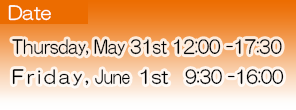This year the NTT Communication Science Laboratories Open House 2018 will be held on May 31st (Thu) and June 1st (Fri) at the NTT Keihanna Building in Kyoto. We will present our latest research findings and accomplishments in the field of information and human sciences through various lectures and exhibitions. We look forward to seeing you!
Outline
Date
- Thursday, May 31st, 12:00 - 17:30
- Friday, June 1st, 9:30 - 16:00
Venue
- NTT Keihanna Building https://www.rd.ntt/e/cs/overview/#access
Admission Charge
- No Admission Charge
- No Pre-Registration Required
Photos of Open House 2017
Program
Head's Talk 5/31(Thu)
- 13:20 - 13:50
Shifting to new dimensions
∼Further initiatives to deepen Communication Science∼
Takeshi Yamada, Vice President, Head of NTT Communication Science Laboratories
Invited Talk 5/31(Thu)
- 14:00 - 15:00
AI, ethics and social impact
Hiroshi Nakagawa, Group director, Artificial Intelligence in Society Research Group, RIKEN Center for Advanced Intelligence Project
Research Talks
5/31(Thu)
- 15:30 - 16:10
The real worth of quantum computers with elementary operations
∼Analysis of computational power of gate-based quantum computers∼
Yasuhiro Takahashi, Media Information Laboratory
6/1(Fri)
- 11:00 - 11:40
Role of haptics in improving wellbeing
∼Science and design of touch can enhance human flourishing∼
Junji Watanabe, Human Information Science Laboratory - 13:00 - 13:40
Beyond combinatorial explosion
∼Enumeration and optimization with Binary Decision Diagrams∼
Masaaki Nishino, Innovative Communication Laboratory - 13:50 - 14:30
Speech production and perception share common brain pathways
∼Investigation of the mechanisms of speech communication by speech conversion and brain imaging∼
Sadao Hiroya, Human Information Science Laboratory
Exhibition Program
Science of Machine Learning
- Finding similar voice recordings in big data
Graph index-based audio similarity search - Learning feature combinations from multiple tasks
MOFM: low-rank regression for learning common factors - Where do they come from? Where are they going?
Data assimilation and navigation learning for crowd - Datafying cities
Event analysis by environmental sensing and machine learning - Memory efficient deep learning for mobile devices
Quantized neural networks for model compression - Optics makes machine learning much faster
Photonic reservoir computing for high-speed machine learning - Interpreting deep learning from network structure
Detecting communities in trained layered neural networks
Science of Communication and Computation
- Can I borrow your quantum memory?
High-speed quantum computations with uninitialized qubits - Designing fault-tolerant networks
Maximizing network reliability via binary decision diagrams - Can computer translate considering context?
Context understanding tests for neural machine translation - Early vocabulary development in late talkers
Collecting and analyzing data from pediatric medical fields - Chatting with robots broadens your knowledge
Integration of chat and QA based on two-robot coordination - Anytime, anywhere, we can speak like a native!
Speech rhythm conversion by mobile application - Sharing enthusiasm between remote sites
Applause coding for bi-lateral immersive sharing
Science of Media Information
- Illumination-based color saturation control
Spectral operation using color enhancement factors - Pay attention to the speaker you want to listen to
Computational selective hearing based on deep learning - Solving two-choice questions makes AI clever
Deep pairwise comparison model for ASR hypothesis selection - Estimating objects' visuals only from audio
Cross-media scene analysis - Cast shadows add dimensions
Projection mapping giving depth illusion to real objects - Converting impression and intelligibility of speech
Speech attribute conversion using deep generative models - Creating favorite images with selective decisions
Hierarchical image analysis and synthesis with DTLC-GAN
Science of Human
- Predicting attention to the ears by the eyes
Auditory spatial attention revealed as pupillary response - Measuring, understanding, and empowering wellbeing
Cross-disciplinary research toward “eudaimonic wellbeing” - Understanding human hearing with AI
Analyzing auditory neural mechanisms with machine learning - How do excellent batters hit the ball?
Cognitive processes revealed by body movements in batting - How do excellent batters look at the ball?
Cognitive processes revealed by eye movements in batting - The sooner you decide, the better you can localize
Visual motion processing in the perception and action - Let’s FEEL shape and action by a force
Can we receive environmental information by Buru-Navi4 ? - Feeling bumps on a flat sheet
Magnetic haptic printing technology
Websites of Open House
- NTT Communication Science Laboratories Open House 2017
- NTT Communication Science Laboratories Open House 2016
- NTT Communication Science Laboratories Open House 2015
- NTT Communication Science Laboratories Open House 2014
- NTT Communication Science Laboratories Open House 2013
- NTT Communication Science Laboratories Open House 2012
- NTT Communication Science Laboratories Open House 2011
- NTT Communication Science Laboratories Open House 2010
- NTT Communication Science Laboratories Open House X Miraisoron 2009









